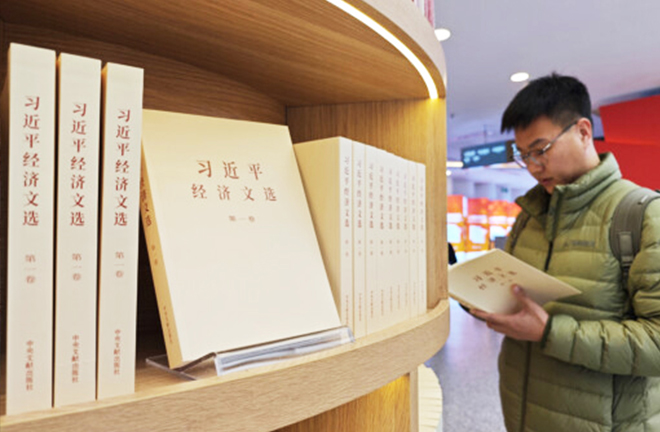Xi Jinping Thought on Economy guides high-quality development

A reader browses the first volume of selected works of Xi Jinping on economy at Beijing Books Building. Photo: Lyu Jiazuo/CSST
The newly published Selected Works offers a vivid chronicle of China’s major economic development efforts in the new era, under the leadership of the CPC Central Committee with Comrade Xi Jinping at its core since the 18th CPC National Congress. It captures the thoughtful and scientific responses of Chinese communists, with Xi Jinping as their representative figure, to critical theoretical and practical questions—chief among them are how to understand and advance economic development in the new era. As a significant theoretical achievement in the CPC’s ongoing efforts to adapt Marxist political economy to China’s national context and contemporary conditions, the book stands as an authoritative and systematic exposition of Xi Jinping Thought on Economy.
Sharp intellectual tools
Since the 18th CPC National Congress, in the face of a complex and challenging international landscape and the demanding tasks of reform, development, and stability at home, the CPC Central Committee with Comrade Xi Jinping at its core has adopted a far-sighted and holistic perspective to navigate the currents of the times. Anchored in the realities of the new era, it has conducted deep reflection and made sound judgments on a wide range of major theoretical and practical issues related to the fundamental guarantees, core position, historical orientation, guiding principles, development paths, and salient themes of China’s economic development.
With a systems-thinking approach, the CPC Central Committee has advanced the Five-Sphere Integrated Plan—coordinating progress across the economic, political, cultural, social, and ecological domains—and the Four-Pronged Comprehensive Strategy, which includes building a modern socialist country, deepening reform, advancing law-based governance, and strengthening Party self-governance. The Party’s overall leadership in economic affairs has been further consolidated, and in light of the new development stage, successive major policy arrangements have been introduced to apply a new development philosophy, establish a new development pattern, promote high-quality development, ensure both development and security, comprehensively deepen reform and opening up, and make solid progress toward common prosperity. Drawing on the consistent successes of China’s economic practice, the CPC Central Committee has distilled a set of new concepts, approaches, and strategies that have guided the Chinese economy to historic achievements and profound transformation, thus giving rise to and shaping Xi Jinping Thought on Economy in practice.
Under the scientific guidance of Xi Jinping Thought on Economy, China’s economy has weathered storms and maintained steady, sustained growth. The nation’s GDP has surpassed 100 trillion yuan (approximately $13.8 trillion), with per capita GDP exceeding $10,000. Its economic strength, scientific and technological capabilities, and composite national strength have scaled new heights, while the economy has become more balanced, coordinated, and sustainable, paving the way for higher-quality development that is more efficient, equitable, sustainable, and safer. Notably, China has won the fight against poverty, lifting nearly 100 million rural residents out of impoverishment—an unprecedented achievement in the global history of poverty alleviation—and has successfully built a moderately prosperous society in all respects. These historic accomplishments mark significant progress in China’s steady march toward national rejuvenation.
Innovations to Marxist political economy
The Selected Works demonstrate that Xi Jinping Thought on Economy, while grounded in the inheritance and innovation of Marxist political economy, has opened a new chapter in the development of socialist political economy with Chinese characteristics. It integrates the core principles of Marxist political economy with China’s specific realities and the imperatives of the present era, generating a range of timely and original theoretical contributions. These innovations are aimed at navigating new circumstances, solving emerging problems, and confronting unprecedented challenges.
They offer in-depth responses to major theoretical and practical questions—questions left unaddressed by classical Marxist theorists, never encountered by earlier generations, and unresolved by Western economic theories. Notable innovations include the theoretical proposition of strengthening the Party’s comprehensive leadership over economic work, which enriches and extends Marxist theories on the relationship between politics and economics. The people-centered development philosophy advances the Marxist understanding of the fundamental nature of a socialist economy, while the establishment and implementation of the new development philosophy enhances Marxist theories on the principles guiding economic development.
Furthermore, the major thesis that China’s economy has transitioned from a stage of rapid growth to one of high-quality development enriches and develops Marxist political economy’s theory of development stages. The pivotal concept of promoting and improving the socialist market economic system advances Marxist political economy’s theory of the market economy. The key policy of supply-side structural reform extends Marxist political economy’s theory on the relationship between production and demand. The strategic initiative to build a new development pattern enriches Marxist political economy’s theory of social reproduction. The theoretical proposition of developing new quality productive forces furthers Marxist political economy’s understanding of social productive forces. The important initiative to promote healthy economic globalization upgrades Marxist political economy’s theory of the world economy. Finally, the theoretical system of Chinese modernization enriches and develops Marxist political economy’s theory of modernization, marking an original contribution to the ongoing evolution of Marxist political economy.
Zhang Kai is a research fellow from the Institute of Xi Jinping Thought on Socialism with Chinese Characteristics for a New Era at Peking University.
Edited by CHEN MIRONG

 PRINT
PRINT CLOSE
CLOSE